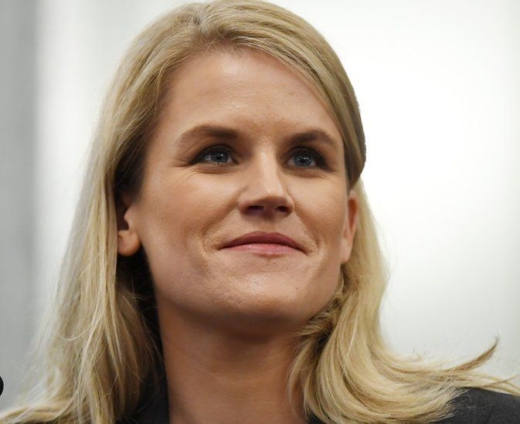Facebook whistleblower Frances Haugen is set to give evidence to UK politicians amid fresh revelations about the company's inner workings.
Ms Haugen will face the committee fine-tuning the UK's proposed Online Safety Bill, which will put new rules in place for big social networks.
It comes as several news outlets published fresh stories based on her thousands of leaked documents.
Facebook, meanwhile, has characterised previous reporting as misleading.
Ms Haugen left Facebook earlier this year, but took thousands of documents when she did so, providing them to the Wall Street Journal.
That paper then ran a series of articles which Facebook considered to be negative - and, it contends, mischaracterised the source material.
But the allegations - that Facebook knew that Instagram was damaging to teenagers' mental health, for example - led to her being invited to testify to politicians and regulators around the world.
I’m looking forward to discussing the Online Safety Bill with the @OnlineSafetyCom in @UKParliament tomorrow
— Frances Haugen (@FrancesHaugen) October 24, 2021
Tune inhttps://t.co/AeUcWb0lc3
Her appearance in London comes at a crucial time in the debate about tech regulation, as the Online Safety Committee considers additions and tweaks to the proposed new rules.
Proposed additions include whether online abuse of women and girls should become a legal offence.
The chair of the committee, MP Damian Collins, said it "will establish a new era of regulation for tech platforms which will make them accountable".
Opaque power
"The real question is around can we, as a public, change the incentives such that it makes more sense for Facebook to invest more money in safety on Instagram," Ms Haugen said in a BBC interview with Ian Russell, the father of 14-year-old Molly Russell, who killed herself after viewing disturbing content on Instagram.
"I'm sure that… the experience Molly had caused them to look at these questions more," she added.
But Ms Haugen said that much quicker progress is needed.
"Facebook's own research shows that a startlingly high fraction of [under-18s] exhibit what is known as problematic use [on Instagram]," she said.
Being unable to control their use of it is "kind of like cigarettes in that way," she added.
"Unquestionably, Facebook could be investing more resources into making the platform safer," she said. "They have made a series of choices to prioritise profits over people.
"Right now there's no company in the world that has as much power as Facebook, and as little transparency."
Fresh revelations
It comes amid a fresh batch of reporting on the leaked documents, which were provided to more than a dozen news organisations to search for additional news lines after the Wall Street Journal's initial series of reports.
NBC News reported on a Facebook internal experiment about a fictional woman's new account which was recommended extreme QAnon conspiracy theory groups within two days. This was based on nothing more than basic interests such as following Fox News and Donald Trump, and expressing an interest in Christianity.
"Within one week, Smith's feed was full of groups and pages that had violated Facebook's own rules, including those against hate speech and disinformation," NBC reported. Facebook told the outlet such research helped lead to its ban on QAnon in October 2020.
Bloomberg, meanwhile, published a new piece detailing the internal staff reaction to the 6 January Capitol riots, including quotes from those who questioned why they were still working for the company.
CNN reported on Facebook's own analysis of the events around 6 January, in which the tech giant's staff said that while "hindsight is 20:20", the procedures the company had in place were inadequate to stop the "Stop the Steal" theory, which falsely alleged that the US presidential election had been subject to massive fraud.
The New York Times, meanwhile, published a story about the impact that Facebook's policies have in India, which it characterised as an "amplified version" of the issues around misinformation, hate speech and violence the company faces elsewhere. A fictional test user in India accepting Facebook's recommendations was apparently subjected to "polarising nationalist content, misinformation, and violence and gore".
Axios reports that Facebook has internally warned its staff to expect "more bad headlines in the coming days".
Facebook has previously denied many of the reports released during the Wall Street Journal's initial reporting, referring to the documents at one point as "stolen".
But at the same time, the company has admitted that in many areas it has more to do - and is taking issue primarily with what it says is misrepresentation or cherry-picking from the leaked documents.
It also points to its long-standing calls for reform of tech industry regulation - which would affect all major big tech firms, not just Facebook.
Latest Stories
-
Trump names conservative media critic as US ambassador to South Africa
14 minutes -
US officials begin trade talks in Delhi as tariff deadline nears
27 minutes -
Niger junta sets out five-year transition to constitutional rule
35 minutes -
China tariffs may be cut to seal TikTok sale, Trump says
48 minutes -
Militants kill 16 on Nigerian army base, military outpost, security sources say
59 minutes -
Trump announces 25% tariffs on car imports to US
1 hour -
Mahama likely to assent to E-Levy repeal bill on Wednesday – Deputy Finance Minister
4 hours -
Poland to suspend migrants’ right to apply for asylum
5 hours -
Zelensky hopes US will ‘stand strong’ in face of Russian demands
5 hours -
‘Only injury will stop me from being a part of the national team’ – Antoine Semenyo
5 hours -
UK-Ghana Chamber of Commerce launches the Grand Challenge Programme
6 hours -
E-levy was a massive error committed by Ofori-Atta, it was a bad policy – Dr. Ashigbey
6 hours -
LoveAid Foundation and partners empower women, girls in STEM
6 hours -
Heavy rainstorm caused power outages in parts of Accra – ECG
6 hours -
National Service Authority deploys 13,700 trained teachers for 2025/2026 National Service
6 hours


